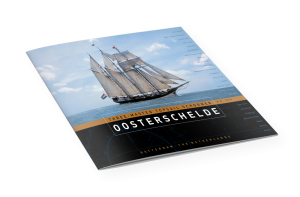26 mrt Lied voor Boudewijn
Lied voor Boudewijn
26 maart 2018
About this song. ‘Toen wij uit Rotterdam vertrokken’ is the best known shanty in the Netherlands. The original song is about a small boy from Rotterdam going to sea for the first time. Tragically, it turned out to be his last journey, too. In the lyrics below the inexperienced boy from Rotterdam has been replaced with a seasoned sailor from the beautiful little town of Delft, where the famous painter Vermeer lived and where Simon Stevin and the mayor of Delft proved Aristotle wrong by dropping lead balls from a leaning tower, long before Galilei got the same idea.
Although the hero of the story – let’s call him Boudewijn – has been to the sea many times, he still does not know what an allemanseindje is. The allemanseindje – literally: everyone’s piece of rope – was used in the past to whipe one’s bum after visiting the toilet. Well, not really a toilet, but a bucket (puts). Contrary to toilet paper, the allemanseindje was used over and over again by all sailors on board.
Unable to distinguish the allemanseindje from other types of rope, desperate Boudewijn grabs any piece of rope he can lay his hand on to clean his bottom. Fortunately for nostalgically oriented lovers of the poetic Dutch maritime terminology there is a huge spectrum of ropes to chose from, all with wonderfully pittoresque names such as smeerreep (literally: dirty bar; it is used in reefing the sails), spruitloperborglijn (a line securing the spruitloper), and mussenstag (‘sparrows’ stay’, high up between the masts). Boudewijn even investigates the possibility of using the anchor chain in his quest for personal hygiene.
The other sailors are understandably quite upset by Boudewijn’s clumsiness, soiling their beautiful schooner ‘Oosterschelde’. They start calling him names such as ezelshoofd, druiloor, hondsvot and lummel. These words all refer to items which can be found somewhere on a sailing ship. (Ask Boudewijn to point them out to you!) Most of them are still in use in standard usage as (mild) insults. The song ends with a lesson for all trainees about the proper use of the allemanseindje. <br/>Acknowledgement. The author would like to thank Boudewijn for sharing his knowledge about maritime terminology and the use of the allemanseindje. Warning. According to the booklet ‘Dit is Knopen en Splitsen’, the allemanseindje is used very differently, at least nowadays.
Dutch lyrics
Toen wij Kaapverdië verlieten
met d’Oosterschelde, ’n ouwe schuit
met schildpadblokken in de midscheeps
en kraaienesten in ’t vooruit,
toen hadden we een Delftse jongen
als eerste stuurman hier aan boord
die voor de tigste keer naar zee ging
maar steeds nog niet wist hoe het hoort.
Zonder papier zit hij op ’t putsje
en vraagt zich af in hoge nood:
Moeder Maria, hoe in godsnaam
veeg ik mijn kont af op zo’n boot?
Wanhopig grijpt hij naar een touwtje,
naar marrellijn of zoetelief,
naar ankerketting, bras of zaling,
want hoge nood maakt inventief,
naar steekbout, mussenstag of smeerreep,
een schoot of val of ’t staande want,
verstaging of spruitloperborglijn
en veegt daarmee zijn achterkant…
Zonder papier zit hij op ’t putsje, etc.
Hij werd gescholden door matrozen.
Hun woordenschat was ongekend!
Ze riepen: ?Ezelshoofd!? en ?Druiloor!?
of ?Baliekluiver die je bent!?
Ze noemden hem een handybilly
of hondsvot, zwaardoor, vingerling,
bramzijgertje, slampamper, lummel,
want schelden dat was echt hun ding…
Zonder papier zit hij op ’t putsje, etc.
Aan boord van schepen, moet u weten,
daar wordt de bilspleet schoongeflost
met een der vele soorten touwtjes
waarmee zo’n schip is uitgedost.
Dat touwtje heet allemanseindje
het zij bij dezen maar vermeld,
want flos je met een ander lijntje,
dan wordt dat niet op prijs gesteld….
Zonder papier zit hij op ’t putsje, etc.
Lied 2:
Ollekebolleke
An ollekebolleke is a light verse with the following rhythm:
higgledy-piggledy
higgledy-piggledy
higgledy-piggledy
higgledy pig.
higgledy-piggledy
higgledy-piggledy
higgledy-piggledy
higgledy pig.
Lines 4 and 8 rhyme. Line 6 consists of a single word (six syllables, main stress on the fourth syllable, secondary stress on the first syllable).
The grandmaster of the ollekebolleke was Heinz Polzer a.k.a. Drs P.
Sal – St. Martin – Havanna with the Oosterschelde
Watch, eat, sleep, watch, eat, sleep,
Portuguese men of war,
Milkyway, birthday cakes,
dying dog sound.
Hoisting and gibing, still
incomprehensible.
Brace and belay! No, the
other way round!





